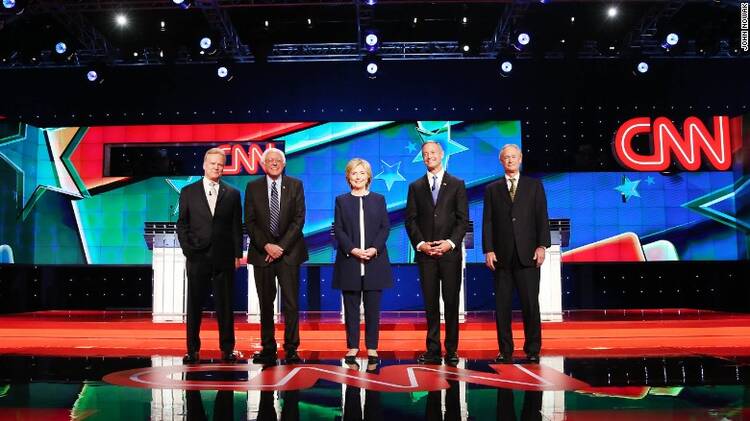The presidential debates tell us a lot about the candidates’ personalities, but watch enough of them and you can also find some striking and unexpected statements about policy, particularly about foreign affairs. In the last Republican debate, Rand Paul’s assertion that an Iraq with Saddam Hussein still in charge and opposing Iran would be better for the United States than what we have now was treated as a gaffe by the media, but the truth is salutary for the public to hear. Hundreds of billions of dollars on the Iraq war bought us worse than nothing. Such comments show why it’s good to have long shots among the debaters well as frontrunners.
In that same debate, erstwhile frontrunner Jeb Bush came across as a nice guy with zero charisma, a man whose name and family connections have brought him money but also some huge political and emotional obstacles. His incredible defense of George W. Bush—“I know one thing: He made us safe” —made you wonder if he was capable of handling the discussion of his brother’s presidency he would face as the Republican nominee.
There was nothing quite as startling in this week’s Democratic debate. Lincoln Chafee did bring up Hillary Clinton’s vote in the Senate to go to war with Iraq as an indication of poor judgment and something that should disqualify her for the presidency. Jim Webb spoke of the disaster Libya has become since the ouster of President Muammar el-Qaddafiand Mrs. Clinton’s contribution to that instability in her role as secretary of state. In both cases she deftly defended herself, but it’s not the handling of the attacks on the American diplomatic compound in Benghazi, but rather the Obama administration’s decision to help topple Qaddafi that Mrs. Clinton should be asked more about and be held accountable for.
The first Democratic debate was tamer than the two Republican debates, which had the flame- thrower Donald Trump to keep viewers glued to the screen. In contrast to the Republican debates, there was little fear-mongering, and the mantra “radical Islamic terrorism” was not invoked. But the event was substantive, informative and illuminating. Lincoln Chafee came across as sincere, decent, principled. He flubbed his answer to a question about his vote on the Glass-Steagall Act, but if he wasn’t smooth, he was sympathetic, and he seemed to be the most pro-peace candidate on the stage. Jim Webb, the former Virginia senator and one-time secretary of the Navy, was the blunt-speaking conservative of the group, the candidate eager to promote his military background and muscular foreign-policy chops.
The debate was my first exposure to former Maryland governor Martin O’Malley. It’s been years since I saw the movie “The Candidate” with Robert Redford, but Mr. O’Malley brought it to mind. He seemed straight from central casting, a perfect choice for a movie about an attractive, ambitious and, ultimately, synthetic politician on the rise. He was the antithesis of Mr. Chafee and Bernie Sanders.
I’d never seen Mr. Sanders for more than a two-minute interview and came away impressed by his conviction, honesty and authenticity; I now have more understanding of why so many people have gotten behind his unlikely candidacy. Finally, Hillary Clinton was poised, polished, prepared. Presidential. Mrs. Clinton, a politician often accused of tacking with whatever political winds will get her elected, looked genuine in comparison with Mr. O’Malley.
There are some people running on the Republican side who worry me. Ted Cruz, Bobby Jindal, Lindsey Graham and Rick Santorum, to mention just a few. And these are candidates with at least a modicum of political experience. But it’s the outsiders like Mr. Trump and Ben Carson who are currently winning favor with the Republican electorate—which seems eager to hand over the American presidency, arguably the most important job in the world, to a tyro.
I look forward to more debates, among the Democrats as well as the Republicans. Maybe not as many as the 20 the Republicans held last time around, but enough to raise awareness of the problems we face as a nation and nudge both voters and candidates toward a more honest assessment of our challenges and what it will take to meet them.








